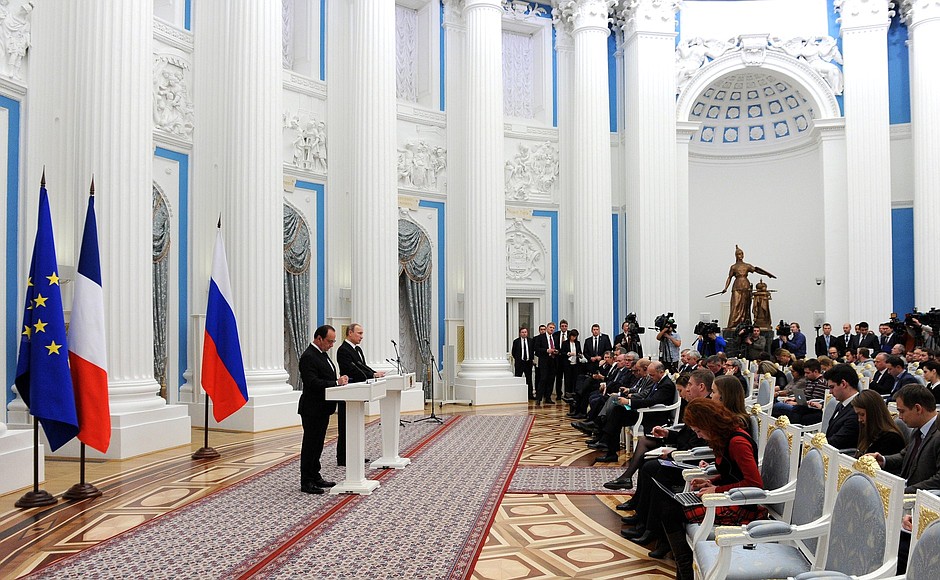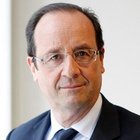President of Russia Vladimir Putin: Ladies and gentlemen, good evening.
The President of France and I have just completed substantive talks, which were held in a trust-based, constructive tone. Naturally, we gave the greatest attention to the issue of jointly combating international terrorism.
The barbaric attack on Russia’s airplane over the Sinai Peninsula, the horrible events in Paris and the terrorist attacks in Lebanon, Nigeria and Mali have left many people dead, including hundreds of Russian and French citizens. This is our common tragedy and we stand united in our commitment to find the perpetrators and bring them to justice.
See also
We have already intensified the Russian Armed Forces operation against terrorists in Syria. Our military actions are effective; militants from the so-called Islamic State and other radical groups are suffering heavy losses. We have disrupted the extremists’ operating mechanisms, damaged their military infrastructure and significantly undermined their financial base – I am referring first and foremost to illicit trade in oil, which generates immense profits for the terrorists and their sponsors.
Those who apply double standards when dealing with terrorists, using them to achieve their own political aims and engaging in unlawful business with them, are playing with fire. History shows that sooner or later such actions will backfire against those who abet criminals.
Russia and France know what it means to act in the spirit of alliance; we have come together more than once throughout our history. Today, we agreed to step up our joint efforts on the anti-terrorist track, to improve the exchange of operational information in the fight against terrorism and establish constructive work between our military experts in order to avoid overlapping incidents and to focus our efforts on ensuring that our work in fighting terror is more effective, avoiding any strikes against territories and armed forces that are themselves fighting terrorists.
The barbaric attack on Russia’s airplane over the Sinai Peninsula, the horrible events in Paris and the terrorist attacks in Lebanon, Nigeria and Mali have left many people dead. This is our common tragedy and we stand united in our commitment to find the perpetrators and bring them to justice.
Mr Hollande and I are looking at this kind of cooperation as concrete and practical input towards forming a broad anti-terrorist coalition, a broad anti-terrorist front under the auspices of the United Nations. I will note that the number of nations sharing this initiative is growing.
We are confident that eradicating terrorism in Syria will create the necessary conditions for achieving a final and long-term settlement of the Syrian crisis. We agreed to continue working together very actively within the framework of the International Syria Support Group and promote the fulfilment of all agreements reached within this group, first and foremost with regard to the deadlines and parameters for holding intra-Syrian talks.
In today’s talks, we could not ignore the situation in Ukraine; in this context, we discussed prospects of cooperating in the Normandy format. We will continue to insist on the implementation of all provisions of the Minsk Agreements of February 12.
The Russian Armed Forces operation against terrorists in Syria is effective; militants from the so-called Islamic State and other radical groups are suffering heavy losses. We have significantly undermined their financial base – I am referring first and foremost to illicit trade in oil, which generates immense profits for the terrorists and their sponsors.
In conclusion, I would like to thank Mr President and all his French colleagues for an open, substantive dialogue. We agreed to continue our discussion in Paris within the framework of the UN Climate Change Conference.
Thank you for your attention.
President of France Francois Hollande (retranslated): Ladies and gentlemen, I wanted to meet with Mr Putin as part of the diplomatic and political initiative that I made the following day after the terrible terrorist attacks in Paris.
I would like to thank Mr Putin and the Russian people for their expression of condolences, sympathy and friendship towards the victims and their families, as well as towards the entire French people.
I personally told Mr Putin again that he can count on my support following the attack on the Russian airliner over the Sinai that took over 220 lives.
We all suffer from terrorism. Terrorism can strike in any part of the world, so it is critical to act. And this is the whole point of our meeting in Moscow. We must respond together.
Last week, the UN Security Council unanimously adopted a resolution that all countries in the world should take the necessary measures to coordinate their efforts to eliminate the Islamic State, and we must pursue this process.
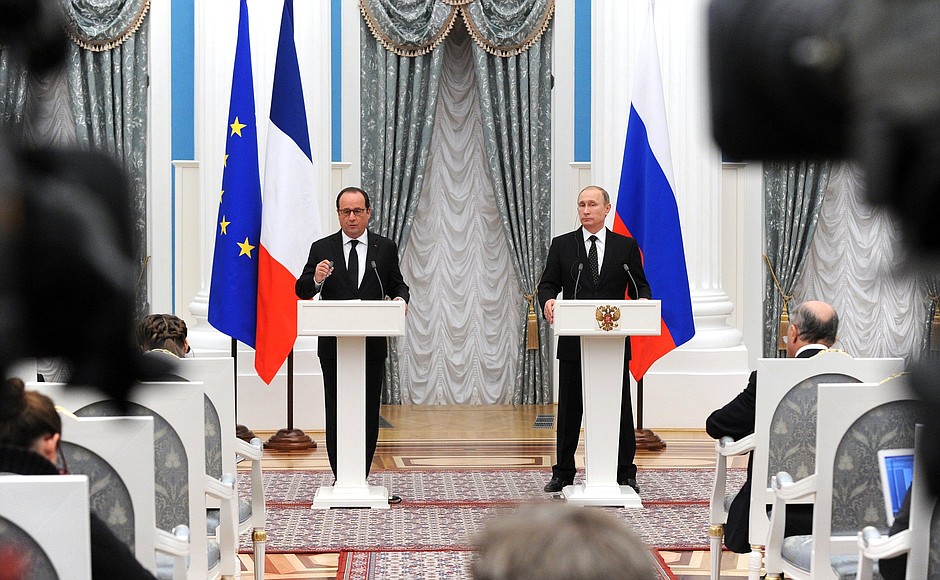
This is the most important reality in today’s world, that is, a broad coalition, to which France will also be a party, a global coalition in the fight against terror. This consensus is essential, but it is not enough. We also need to assume responsibility.
This is precisely what France is doing when it attacks ISIS operations centres, when it attacks the oil wells that the terrorists use to smuggle oil and obtain financial resources.
We intensified our efforts. We deployed the aircraft carrier Charles de Gaulle to the Mediterranean and we’ve done everything we can to ensure that our military will be actively involved in eliminating ISIS.
We agree with Mr Putin that it is essential to cut this evil off. Since 2011, the chaos in Syria has created a huge wave of refugees, over 300,000 people have been killed, and so now we must find a political solution to this crisis, but there are requirements for this that should be followed.
We believe that the following conditions should be met if we are to ensure a political transition process. A coalition government, an independent government, should be formed during a transition period.
This transitional period should lead to the adoption of a new constitution, elections should be held with the participation of all political factions, groups and members of the expatriate community. And it goes without saying that Assad does not have any role to play in the future of his country.
However, in order to achieve this, it is imperative that Russia should play the main, one of the main roles in this process. I’ve told Mr Putin that France is ready and willing to work with Russia hand in hand towards our common objective, which is to fight terrorist groups, above all ISIS. It is for this reason that I believe our meeting today to be of outmost importance. Mr Putin and I have agreed on three main points.
First, we intend to step up the exchange of intelligence and any other information between our respective forces.
Second, we will intensify strikes against ISIS and coordinate them so as to enhance their efficiency.
Third, as Mr Putin has also pointed out, we must make sure that our air strikes concentrate on the Islamic State and terrorist groups.
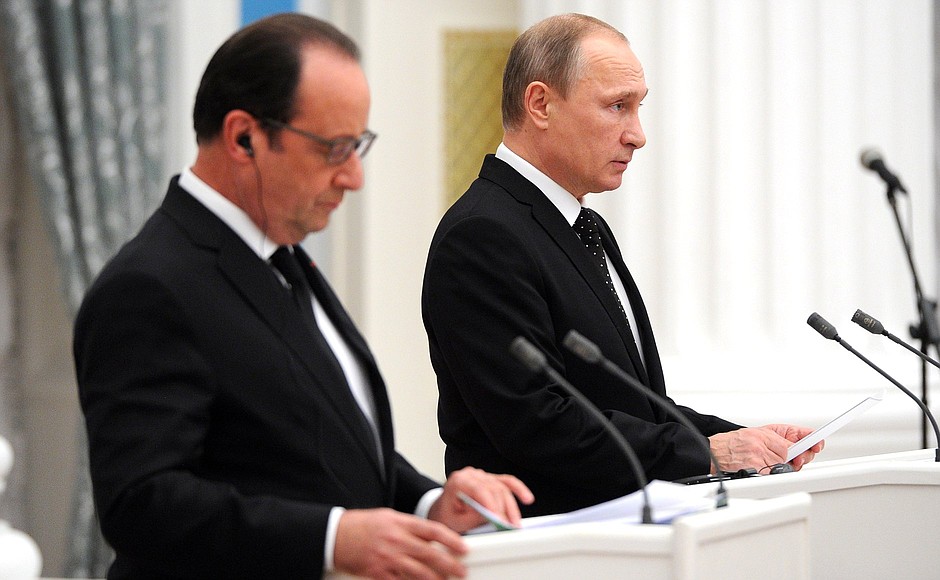
Let me emphasise that Europe is about to mobilise its forces to combat terrorism. I would like to ask defence ministers from across Europe to take the necessary decisions for coordinating their actions. The United Kingdom will also participate. I spoke with Mr Cameron about this. I also discussed a number of issues with Ms Merkel yesterday. Mr Putin and I have also agreed that we will exchange information and specific actions as regards another important issue – the developments in eastern Ukraine. We will continue to work on that within the Normandy format.
Last time we met in Paris, all four of us, we touched upon the Syrian issue and spoke about the need for coordinated actions. Today, we took this issue even further. Our fight against terrorism in Syria does not affect France’s commitment to find a political solution to the Ukrainian crisis.
We must fully implement all the measures that are stipulated in the Minsk Agreements. This is why I wanted to come to Moscow today to meet with Mr Putin. Mr Putin will come to Paris on Monday to participate in the Climate Change Conference. I think the current situation and the fight against terrorism required my visit to Moscow today.
Question (retranslated): Good evening. A question for Mr Putin. Mr President, do you agree that Mr Assad remaining in office hinders the achievement of your common goals? Have you agreed about which groups should and should not be the targets of air strikes?
Vladimir Putin: I believe that the fate of the President of Syria should be entirely in the hands of the Syrian people.
Moreover, we all agree that it is impossible to successfully fight terrorism in Syria without ground operations, and no other forces exist today that can conduct ground operations in the fight against ISIS, Jabhat al-Nusra and other terrorist organisations aside from the Syrian government army.
We are confident that eradicating terrorism in Syria will create the necessary conditions for achieving a final and long-term settlement of the Syrian crisis.
In this respect, I feel that President Assad’s army and he himself are our natural allies in the fight against terrorism. There may be other forces there that talk about their readiness to fight terror. We are currently attempting to establish ties with them, have already done so with some of them, and as I have said many times, we will be prepared to support their efforts in the fight against ISIS and other terrorist organisations, as we support Assad’s army.
We agreed – I feel this is a very important part of our agreements with Mr President today – that just as with certain other countries in the region, we will exchange information on which territories are occupied by healthy opposition groups, rather than terrorists, and will avoid air strikes there. We will also exchange information when we – France and Russia – are absolutely certain that particular territories are occupied by terrorist organisations and we will coordinate our efforts in those areas.
Question: I have a question for the President of Russia. Mr President, we are currently talking about a broad-based coalition and in this regard, I have a question about Turkey’s particular place in this story. Today, for example, the Russian military reported that they intensified strikes on the Syrian quadrant where the Russian plane was downed.
At the same time, the Turkish media are practically accusing Russia of bombing a humanitarian convoy. In this context, did you discuss Turkey during your talks with Francois Hollande? And what can you say about Turkey’s role in this whole story and in our relations with it?
Vladimir Putin: As you know, Turkey is a member of the North Atlantic Treaty Organisation; France is also a NATO member, so we understand France’s position in this situation. But Mr President expressed his condolences following the death of our servicemen, and we are grateful to him for that.
It is impossible to successfully fight terrorism in Syria without ground operations, and no other forces exist today that can fight on the ground aside from the Syrian government army. President Assad’s army and he himself are our natural allies in the fight against terrorism.
As for the territory you mentioned, where our servicemen died, indeed, Syria’s armed forces used multiple rocket launchers which we supplied recently to the Syrian army, in coordinated actions with our Air Force, and intensified strikes in this area right after we received credible information that one of our servicemen was killed and we were able to save the second one. How could it be otherwise? That is how it should be.
In this regard, I want to comment on what we are hearing about certain tribes close to Turkey, the Turkmens and so on. First of all, a question arises: what are representatives of Turkish terrorist organisations, who show themselves on camera and post themselves all over the Internet, doing in these territories?
Second, what are nationals of the Russian Federation, whom we are seeking because of their crimes and who are clearly classified as international terrorists, doing in that territory? Our servicemen were working in this quadrant to prevent the possible return of these people to Russia’s territory to commit crimes; they were fulfilling their duties to their Fatherland, to Russia directly. Directly! Question: what are these people doing there? And we feel it is absolutely justified to intensify the efforts of our aviation there and support the intensification of the Syrian forces’ efforts.
As for shelling a humanitarian convoy, as far as I know, the humanitarian organisation that the Turkish authorities are referring to has already stated that its convoys and representatives were not in that area at the time. There may have been some sort of convoy there, but it certainly wasn’t peaceful. If there was some sort of convoy, then I suppose, in accordance with international law, it was necessary to determine what kind of convoy it was, where it was headed and what it was doing. And if none of this was done, then we suspect that this convoy was not carrying a purely humanitarian cargo. This serves as another piece of evidence of abetting international terrorists.
Question (retranslated): Good evening, I’m addressing both presidents. Mr Putin, why have you deployed S-400 multiple launch rocket systems? Mr Hollande, is the deployment of the S-400s in keeping with the spirit of the international coalition’s efforts?
Vladimir Putin: S-400 is not a multiple rocket launcher system but an anti-aircraft missile system. We did not have these systems in Syria because our aviation is working at heights where the terrorists’ criminal hand cannot reach. They do not have the corresponding military technology that is capable of taking down planes at a height of more than three or four thousand metres. It had never occurred to us that we could be hit by a country that we considered our ally.
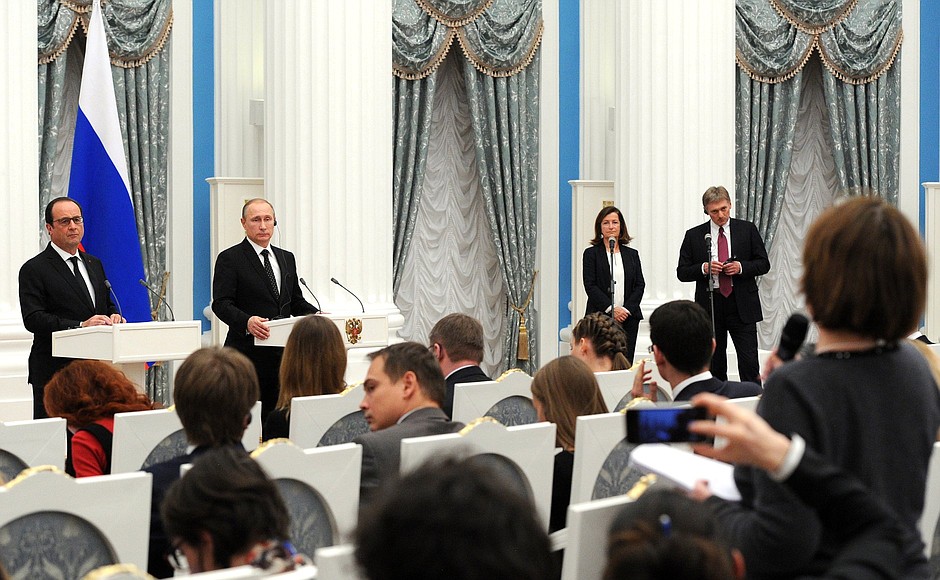
After all, our planes, flying at a height of five to six thousand metres, were absolutely unprotected; they were not protected against possible attacks by fighter jets. If we had even thought this might be possible, then first of all, we would have long ago established systems there to protect our planes against possible attacks.
Moreover, there are other forms of technology and military protection, for example, fighter escorts, or at least technical means of defence against missile attacks, including thermal guards. Experts know how this can be done.
I repeat, we did not do any of this because we believed Turkey to be a friendly state and simply did not expect an attack from that country. That is precisely why we consider what has happened to be a treacherous blow.
Now we have seen that this is possible; we have lost people there. We are obligated to ensure the safety of our aircraft. So we have deployed a modern S-400 system there. It operates at a long distance and is one of the most effective systems in the world of its kind.
But we will not limit ourselves to that. If necessary, we will complement the activity of our aircraft by fighters and other means, including electronic warfare. There are actually many kinds, and now we will be applying them.
This does not in any way contradict what we are doing with the coalition headed by the United States. We are exchanging information with it, but we are very concerned by the nature of the exchanges and the results of our joint work.
We believed Turkey to be a friendly state and did not expect an attack from that country. That is precisely why we consider what has happened to be a treacherous blow.
Just look: we warned our US partners in advance about where our pilots would be operating, when, and at what flight levels. The American side, which heads the coalition that includes Turkey, knew about the location and time of the flights. And that is precisely where and when we were hit.
So I ask you: why did we provide this information to the Americans? Either they cannot control what their allies are doing, or they are handing out the information left and right, without understanding the consequences. Naturally, we will need to have some serious consultations with our partners on this matter. But the air defence system is not in any way directed against our partners, with whom we are fighting terrorists in Syria.
Francois Hollande (retranslated): If I may, I’d like to comment on the incident that took place on Tuesday as a result of which a Russian bomber was shot down by Turkey. This is a very serious incident, and I regret that it happened. I’ve said this to President Erdogan and to the Russian President.
It is absolutely clear that it is necessary to avoid any risk and any possible repetition of this sort of thing at this time and place. It is critical that we refrain from escalating the situation. The only goal that we should all set for ourselves is the fight against ISIS and the elimination of the terrorists. We have no other goals.
Therefore, we should draw the following conclusions. We must enhance coordination between our countries so that the armed forces present in the region and the aircraft capable of conducting air strikes do not interfere with each other so as to prevent any encounters leading to deplorable consequences and collisions. We must do our outmost to prevent this from happening again. It is for this reason that I have taken initiatives aimed at stepping up joint efforts and cooperation. I have been doing it for the very purpose I’ve just stated.
Finally, what have President Putin and I agreed upon? This is a very important point: we have agreed on the need to carry out strikes against terrorists only, only against ISIS and jihadist groups. It is crucial in this respect that groups that are also combating terrorists are not targeted by air strikes. It is in this area that we intend to share information with each other, as was discussed during the meeting.
We have to understand who can fight and who can’t, who should or should not be targeted. Consequently, our current objective is to try to avoid any incidents of this kind between the countries that are engaged in counter-terrorist efforts in Syria. Second, we must identify goals that would be clear to everyone.
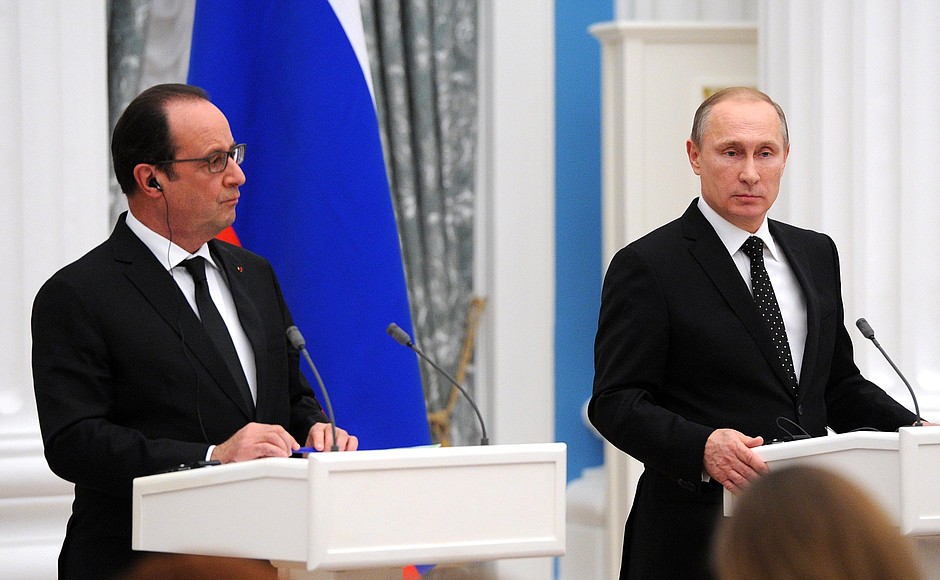
Question: You spoke of the need to establish a broad coalition. Is this the kind of coalition you spoke about at the UN conference, or will competition continue between coalitions? If competition does continue, we would have to wonder about just how effective such coalitions can be, especially after the incident with the Russian plane. Or do you envisage a new common coalition, and if so, is it possible that such a coalition could potentially act in other countries also under threat from ISIS, and not just in Syria?
Coming back to the incident with the Russian plane, just a few hours ago, the Turkish President said in an interview that if the Turkish Air Force had known that the plane was Russian, they would not have acted as they did. He also said that the Turkish forces destroy all oil shipments they seize from ISIS, and that if Russia has other information and can prove otherwise, the President is ready to step down. I would like to hear your comments on these statements.
Vladimir Putin: Regarding the coalition, President Hollande and I discussed this issue today. We respect the coalition the United States is heading and are ready to work with this coalition. We think it would be best to establish a unified, common coalition. This would make it simpler and easier, and, I think, more effective to coordinate our common efforts in this situation. But if our partners are not ready for this… In fact, this was what I spoke about at the UN. But if our partners are not ready for this, fine, we are ready to work in other formats, in whatever format our partners would find acceptable. We are ready to cooperate with the US-led coalition.
We are obligated to ensure the safety of our aircraft and have deployed a modern S-400 system there. It operates at a long distance and is one of the most effective systems in the world of its kind.
But of course, incidents such as the destruction of our plane and the death of our servicemen – the pilot, and a marine who was attempting to rescue his brothers in arms – are completely unacceptable. Our position is that this must not happen again. If this is not the case, we do not need such cooperation, with anyone, any coalition or country.
I discussed all of this in detail with the President of France. We agreed to work together over this coming time, in bilateral format, and with the US-led coalition in general.
The question is one of delineating the territories that are targets for strikes and those where it is better to refrain from launching strikes, exchanging information on these and other matters, and coordinating action in the combat zone.
As for the oil question and the assertion that it is destroyed on Turkish territory, at the G20 summit, which took place in Turkey as it happens, in Antalya, I showed a photograph (I had already spoken publicly about this) taken by our pilots at a height of 5,000 metres. Vehicles transporting oil made a long line that vanished over the horizon. It looks like a living oil pipeline. These are industrial-scale oil supplies coming in from parts of Syria now in the terrorists’ hands. This oil comes from these regions, not from other places. We see from the air where these vehicles are heading. They are heading for Turkey day and night. I can imagine that perhaps Turkey’s senior leaders are not aware of this situation. It is hard to believe, but theoretically, it is possible.
This does not mean that the Turkish authorities should not attempt to put an end to this illegal trade. The UN Security Council passed a special resolution that bans direct purchase of oil from terrorists, because these barrels coming in are filled not just with oil but with our citizens’ blood, and because terrorists use the money from this trade to buy arms and munitions and then carry out bloody attacks such as those against our plane in the Sinai, and the attacks in Paris and other cities and countries.
Incidents such as the destruction of our plane and the death of our servicemen are completely unacceptable. Our position is that this must not happen again.
If the Turkish authorities are destroying this oil, why do we not see smoke from the fires? Let me say again that this is oil supply on an industrial scale. You would need to build entire special facilities to destroy this oil. Nothing of this sort is taking place. If Turkey’s senior leadership is not aware of the situation, let them open their eyes to it now.
I would be willing to believe that some corruption and shady deals might be involved. Let them sort out just what is going on there. But there is absolutely no question that the oil is heading for Turkey. We see this from the air. We see that loaded vehicles are heading there in a constant stream and returning empty. These vehicles are loaded in Syria, in territory controlled by the terrorists, and they go to Turkey and return to Syria empty. We see this every day.
Regarding the question of whether or not the Turkish President should step down, this is absolutely no concern of ours but is the Turkish people’s affair. We have never meddled in others’ affairs and will not do so now. It is a great pity though to lose the unprecedented level of bilateral relations that we developed with Turkey over these last years. We really did reach a very high level of relations and we looked at Turkey not just as our neighbour but also as a friendly country and practically an ally. It is very sad to see this so heedlessly and brutally destroyed.
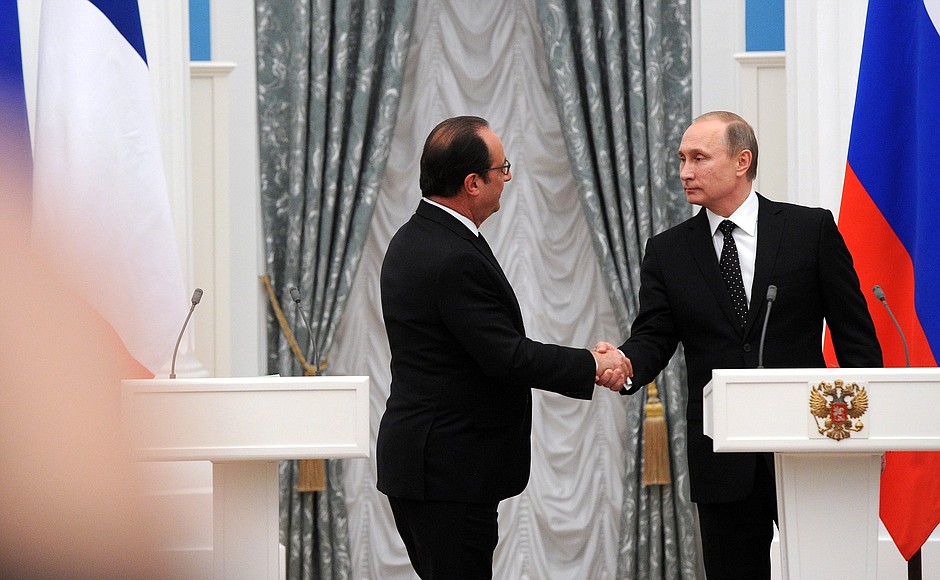
Francois Hollande (retranslated): If you’ll allow me, Mr Putin, I’d like to respond to the question that was addressed to you, but from the French perspective.
There is a coalition. It has been around for several months. France is a member of it. The coalition’s main field of activity was Iraq. Together with the Iraqi government, we’ve sought to provide essential support to all those fighting ISIS and terrorism, which, unfortunately, is bleeding the country dry – that is, Iraq.
Then the geographical scope of the coalition’s operations expanded to include Syria’s territory. France is also operating in Syria in keeping with coalition policy and the decision that I made in September. At first, we conducted reconnaissance flights and now we’ve moved on to air strikes. This is being done under the right to self-defence. And we have this right because we know for a fact that the terrorists who acted in Paris and in the Paris suburb of Saint-Denis were trained in Syria and, unfortunately, were trained very well to carry out these heinous terrorist attacks.
Now we want coordination. This is critical. We absolutely need it. First, to avoid these kinds of incidents, and second, to fight ISIS, terrorism more effectively. This coordination should be a form of collaboration – the sharing of intelligence and the exchange of information regarding terrorist concentration areas. All of this will enable us to act effectively. The UN Security Council resolution calls for this kind of action, and I welcome the European countries that have assumed responsibility for this as part of their commitment.
Regarding further action on our part, it is necessary to attack ISIS, its training centres, the centres where this terrorist army is being trained, but most importantly, attack its sources of financing, the sources of its livelihood – primarily oil.
If there is some other way of improving cooperation it is difficult to think of one without effectively engaging the trucks carrying oil that goes to those who’ve appropriated the right to buy it, thus providing ISIS with uncountable amounts of money. We don’t want to stop and will continue to attack these convoys and the oil processing plants or refineries – oil that, without a doubt, serves as the main source of financial income for ISIS.
Finally, I cannot help but reiterate that we should support the groups that can reverse the situation on the ground and recover this territory. It is very important for France, as well as for the other coalition members, to support such groups in fighting ISIS. They have the same goal – to fight ISIS and destroy this terrorist group.
Vladimir Putin: As for the idea that the Turkish air force did not recognise our plane, this is simply not possible. It is out of the question. Our planes have identification marks that are easily visible. They were obviously our planes and not anyone else’s.
At the G20 summit in Antalya I showed a photograph taken by our pilots. Vehicles transporting oil made a long line that vanished over the horizon. These are industrial-scale oil supplies coming in from parts of Syria now in the terrorists’ hands. These vehicles are heading for Turkey day and night.
Furthermore, let me say again that in accordance with our agreements with the Americans, we always gave prior information on where our planes will operate, on the formations, locations and times. Our position is that this is a working coalition, and Turkey, as a member of this coalition, should have known that Russian aircraft were operating in this location at that moment. Who else’s planes could they have been? What would they have done if they discovered that it was an American plane? Would they have fired at an American plane? This is all a load of nonsense, just an attempt to make excuses. It is a shame that instead of making a thorough investigation of the situation and taking steps to make sure such things never happen again, we hear from them these unclear explanations and statements to the effect that there is nothing even to apologise for. Well, this is not our choice, but Turkey’s choice.
